323 Products
-
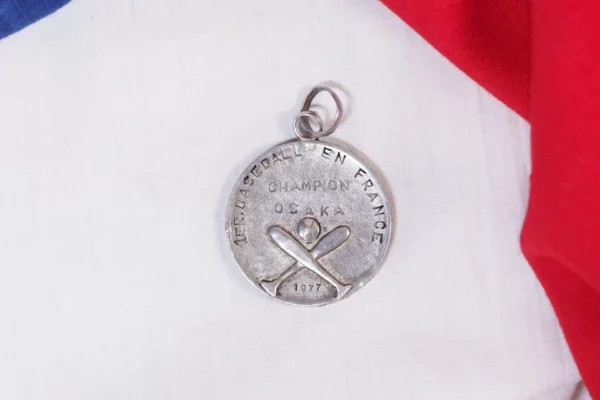
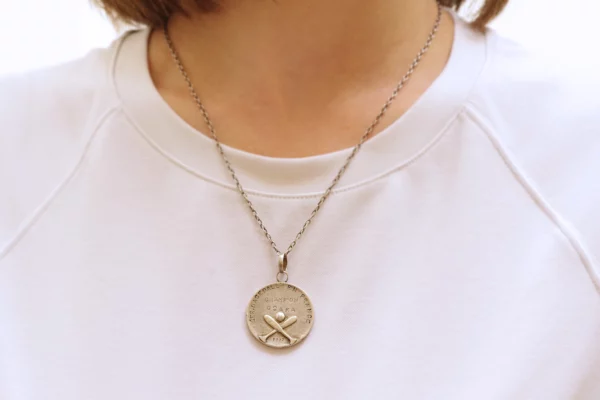 130,00€
130,00€Antique baseball medal in 935 thousandths silver. Former 5 franc coin transformed into a medal inscribed with “1ER BASEBALL EN FRANCE”, “CHAMPION OSAKA”. On the medal, two crossed baseball bats under a ball. Below, the date “1977”. On the reverse, the French sower from old coins. Jewelry from the 1970s, France. Sport jewelry collection.
Height (including the bale): 40 mm
Width: 28 mmCondition: scratches from use
Weight: 12.69 gr
More information : Baseball made its first appearance at the 1912 Summer Olympics in Stockholm as a demonstration sport. It wasn’t until 80 years later, in Barcelona, that it became an Olympic sport. It will not be represented at the 2024 Paris Olympics but will be present at the 2028 Los Angeles Olympics.
*The antique chain is not sold with the jewel*
See our antique chains -
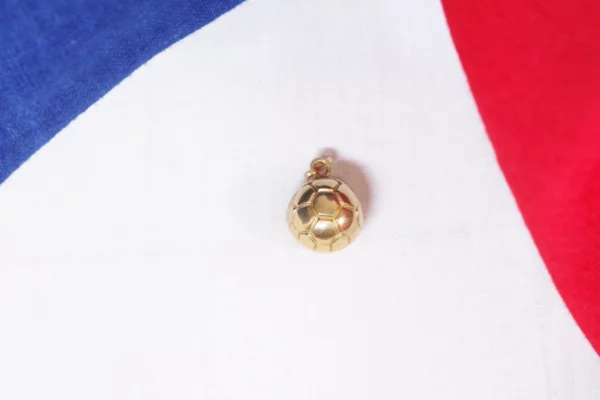
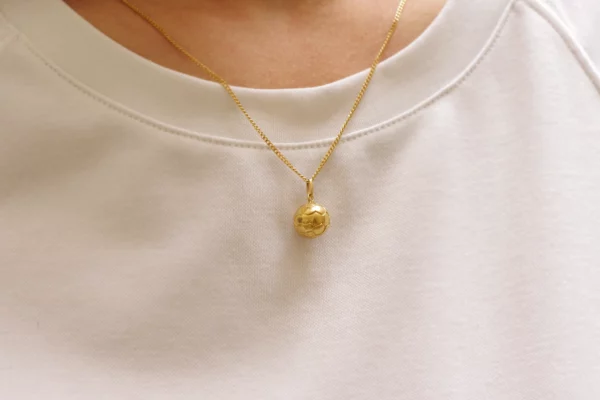 150,00€
150,00€Soccer ball pendant in 18 karat gold (750). This sports-themed pendant is shaped like a soccer ball. Vintage French pendant, circa 2000. Sport jewelry collection.
Hallmarked with an eagle’s head (french state hallmark for 18 karat gold) and maker’s mark.
Height (including bail): 15 mm
Width: 10 mmCondition: signs of wear
Weight: 0.82 gr
More information : Soccer, known as football in many countries, originated in the late 19th century, with its International Federation, FIFA, founded in 1904.
*The antique gold chain is not sold with the jewel*
See our antique chains -
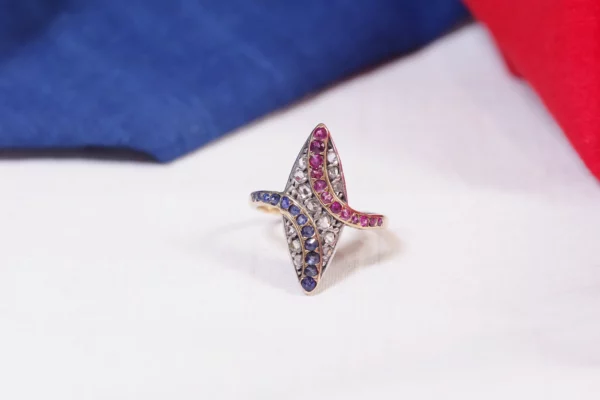
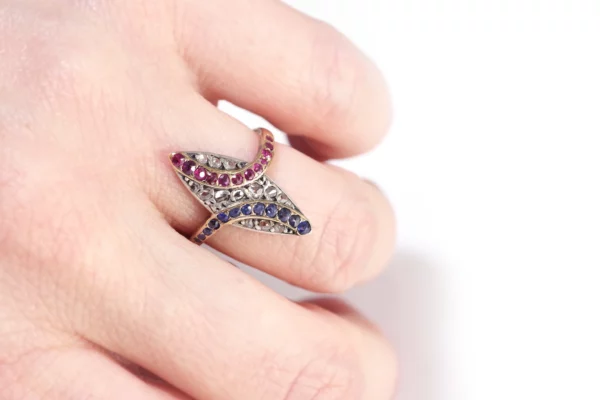 1600,00€
1600,00€Patriotic marquise ring in 18 karat gold (750 thousandths) and silver. Antique marquise-style ring set with a row of rose-cut diamonds, bordered by a row of 12 rubies and a row of 12 sapphires, symbolizing the colors of the French flag. Antique marquise ring, circa 1870.
Hallmarks: owl and swan (french state hallmark for 18 karat gold and silver)
Finger size: 48 EU or 4.25 US (resizing possible)
Dimensions of the ring head: 21 x 8 mm
Total estimated weight of sapphires: 0.07 carats
Total estimated weight of rubies: 0.07 carats
Total estimated weight of diamonds: 0.08 caratsCondition: antique setting, scratches from use
Weight: 2.92 gr
More information : The wearing of patriotic jewelry as a sign of protest or resistance became widespread after the French Revolution (1789-1799) and during the Napoleonic era.
-
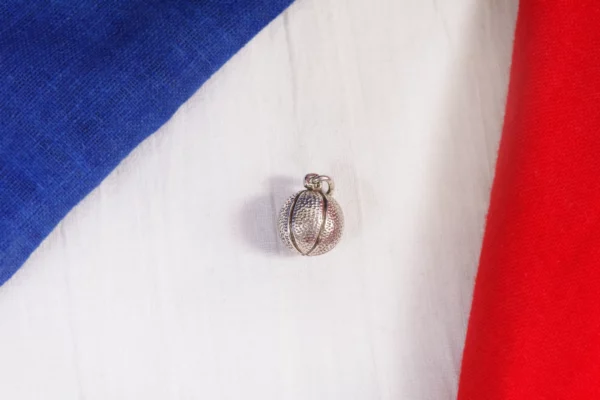
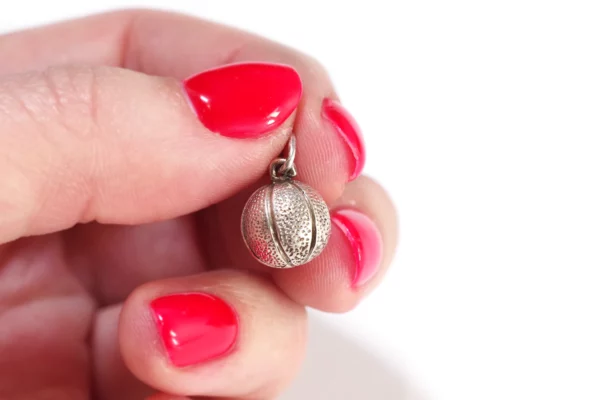 50,00€
50,00€Basketball pendant in 800 silver. This sports-themed pendant features a basketball with grooves and small dots. Basketball was invented in December 1891 in the United States. Vintage pendant, circa 2000. Sport jewelry collection.
Hallmarked 800.
Height (including bail): 25 mm
Width: 15 mmCondition: signs of wear
Weight: 2.29 gr
*The antique chain is not sold with the jewel*
See our antique chainsMore information : The first European game was played in 1893 in Paris, in the Montmartre district, home to the YMCA headquarters and the oldest basketball court in the world.
-
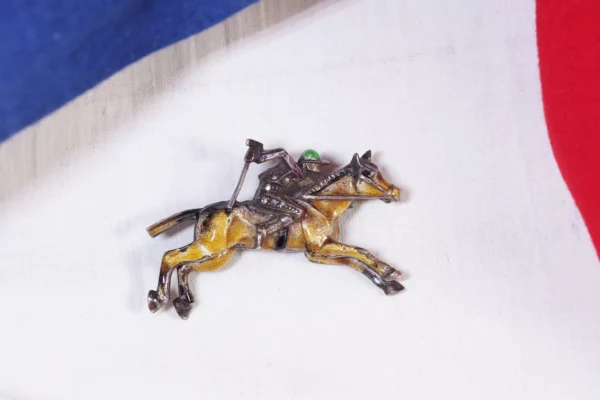
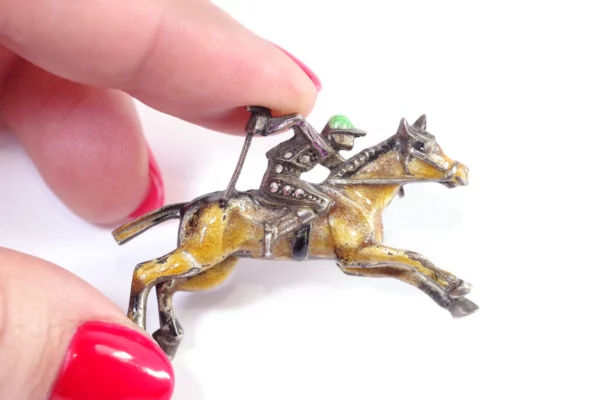 160,00€
160,00€Art Deco jockey brooch in 935 silver. This antique sports brooch features a jockey and his horse in the midst of a horse race. The jockey’s jacket and pants are set with marcasites. His cap is enameled green, and the horse’s coat is enameled brown (isabelline color). Antique brooch, Edwardian Art Deco period, early 20th century. Sport jewelry collection.
Poinçon 935 and illegible maker’s mark
Dimensions: 2.5 x 4.3 cm
Note: the clasp is secure
Condition: some enamel loss, signs of wearWeight: 8.46 gr
More information : Equestrianism has been included in the Olympic program since the 1900 Paris edition, with three jumping events. Since 1912, this sport has always been present at the Olympic Games.
-
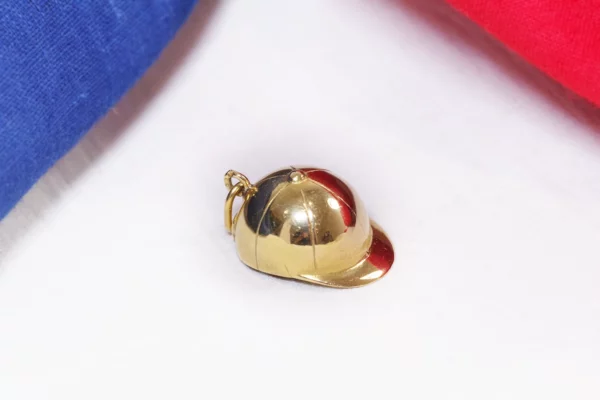
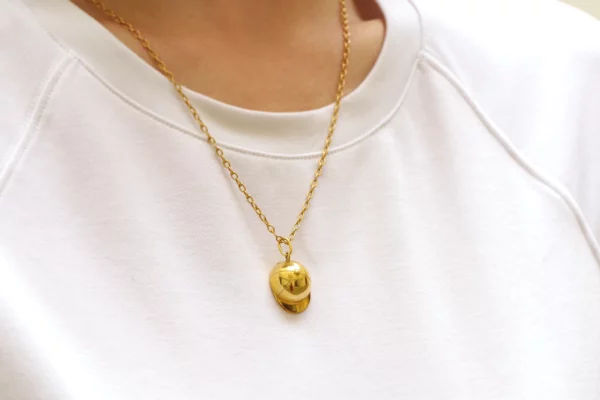 400,00€
400,00€Riding helmet pendant in 18 karat yellow gold (750). This pendant represents an equestrian helmet, also known as a “toque,” though it is increasingly referred to as a helmet. It is decorated with grooves. The helmet is the protection that riders wear on their heads for horseback riding. Vintage pendant, circa 1980, France. Sport jewelry collection
Hallmarked with an eagle’s head (french state hallmark for 18 karat gold)
Height (including bail): 28 mm
Width: 15 mmCondition: signs of wear
Weight: 3.82 gr
*The antique gold chain is not sold with the jewel*
See our antique chains -
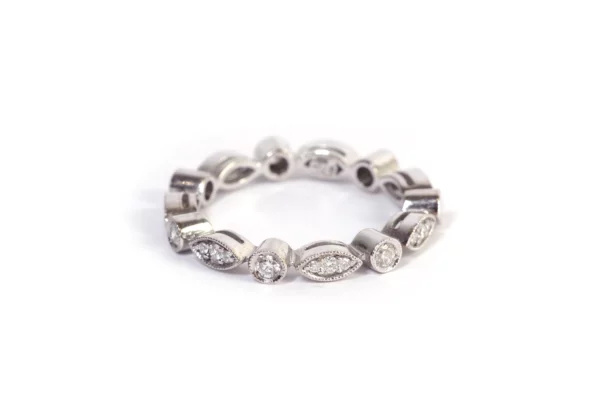
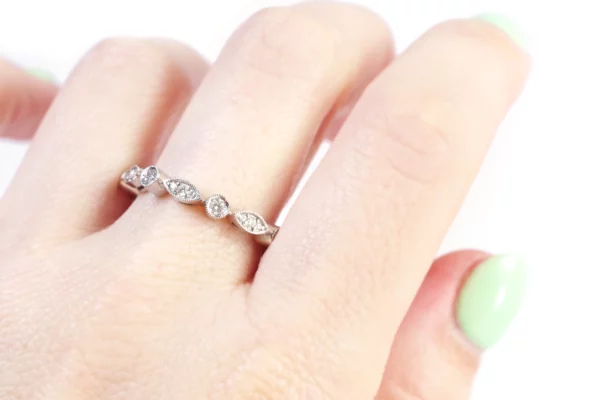 1100,00€
1100,00€Vintage diamond eternity band in 18 karat white gold. This vintage ring features 28 brilliant-cut diamonds (0.43 ct) set in alternating round and oval bezels, forming a continuous circle around the finger. Preowned diamond ring, circa 2000.
French owl hallmark (french state hallmark for 18 karat gold)
Ring size: 54 EU or 6.45 US (not resizable)
Band width: 3 mm
Height: 3 mmEstimated diamond weight: 0.43 ct
Condition: light wear scratches
Weight: 3.47 gr
*The antique box is not sold with the jewel*
-
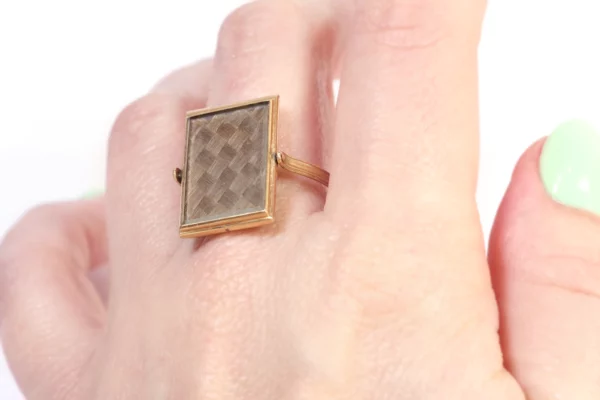
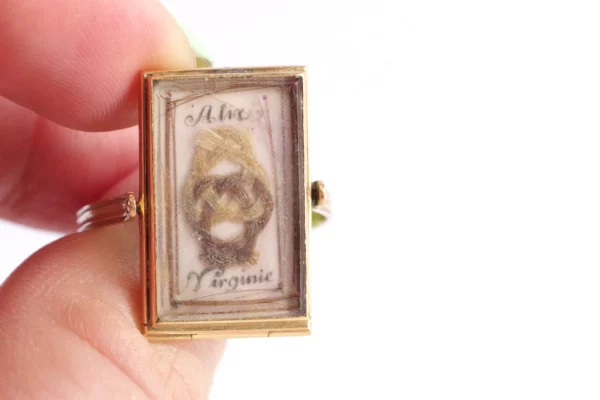 2000,00€
2000,00€Georgian sentimental swivel ring in 18k gold. This georgian ring features a rectangular swivel bezel, with one side containing two intertwined locks of hair—one blonde, the other brown—alongside the names “Alix” and “Virginie,” and the other side displaying a flatly braided hair rectangle. A sentimental ring representing two lovers from the early 19th century, France.
Hallmark: rooster facing right (1798-1809, France)
Ring size: 60 EU or 9 US
Swivel bezel dimensions: 21 x 13 mm
Condition: wear scratches, slight dent inside the band, some hair detached.
Weight: 3.68 gr
Sentimental jewelry, often known as mourning or lover’s jewelry, was particularly popular during the 18th and 19th centuries. These pieces frequently incorporated personal elements like hair, inscriptions, or miniature portraits, serving as intimate mementos of loved ones. Hairwork, in particular, was a cherished practice, symbolizing enduring connections and memories.
-
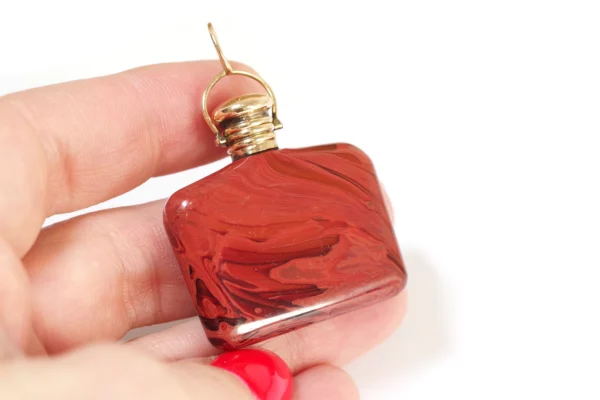
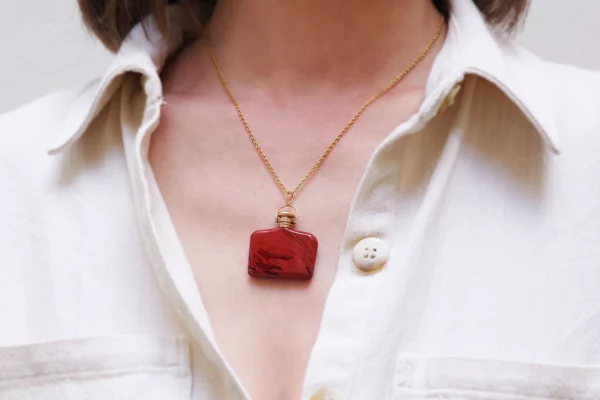 1200,00€
1200,00€Antique perfume bottle pendant in glass and 18 karat (750) rose gold. Glass perfume bottle imitating red jasper. The upper part of the bottle is made of rose gold, a lid opens onto a small glass stopper and a mobile clasp allows it to be hung as a pendant. Antique pendant from the early 19th century, France.
Ram head hallmark (active between 1819-1838, french state hallmark for 18 karat gold)
Height: 4.5 cm
Width: 3.2 cmCondition: scratches from use
Weight : 12.11 gr
*The antique gold chain is not sold with the jewel*
See our antique chains -
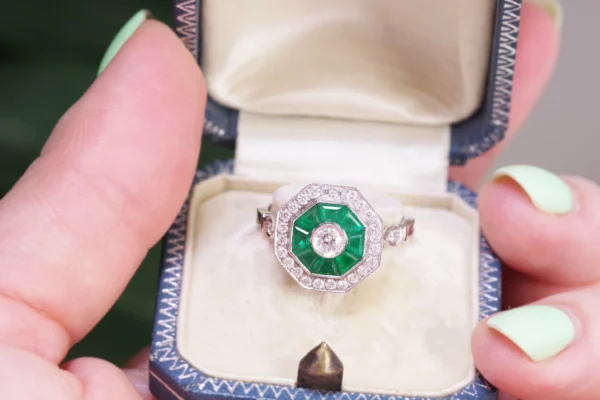
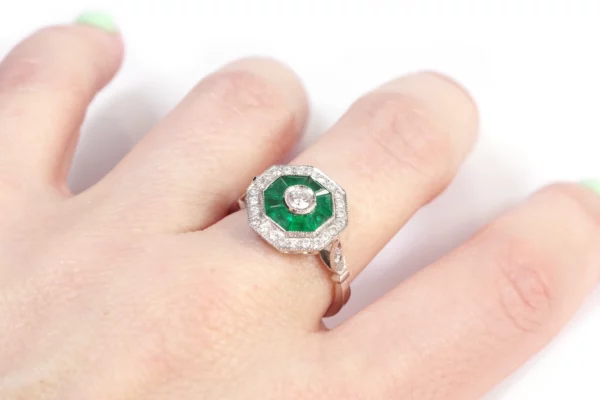 3100,00€
3100,00€Art Deco style emerald diamond ring in 18 karat white gold. Octagonal ring centered by a 0.20-carat brilliant-cut diamond in a beaded setting. The diamond is surrounded by eight calibrated emeralds (0.82 cts) and 24 brilliant-cut diamonds (0.23 cts). Art Deco ring, circa 1990, France.
Eagle head hallmark (french state hallmark for 18 karat gold)
Finger size: 54 UE or 6.75 US (can be changed)
Ring head dimensions: 13 mm
Estimated weight of central diamond: 0.20 carat
Estimated weight of emeralds: 0.82 carat
Estimated total diamond weight : 0.43 caratCondition : Fine wear scratches
Weight : 3.77 gr
*The antique box is not sold with the jewel*
-
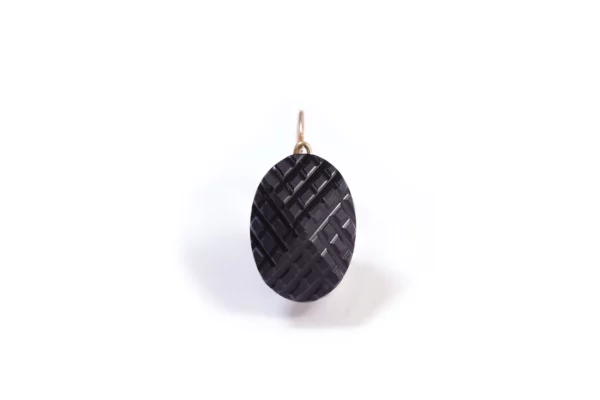
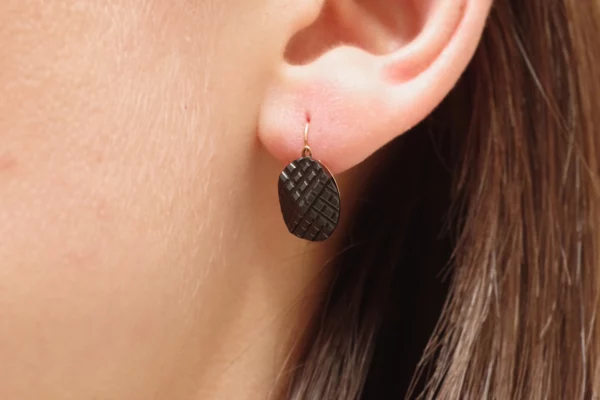 140,00€
140,00€Single black dormeuse earring in 18 karat rose gold (750/1000). Unique dormeuse earring decorated with black glass imitating jet, known as “verre de Paris.” The glass is pointed and decorated with a grid pattern. Antique single earring, circa 1830, France. Unmatched piece.
Hallmark: ram’s head (1819-1838, french state hallmark for 18 karat gold)
Height: 18 mm
Width: 9 mmCondition: wear and tear. This earring is sold individually.
Weight: 1.31 gr
-
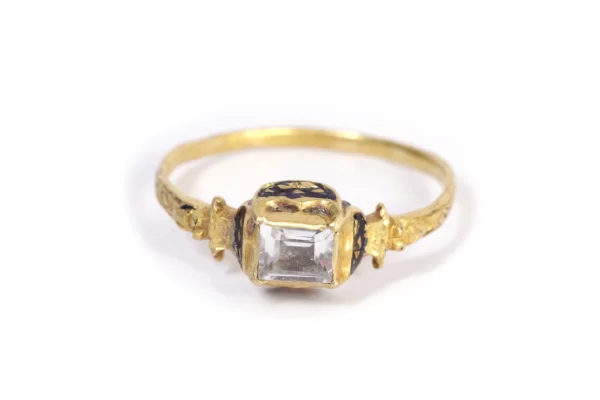
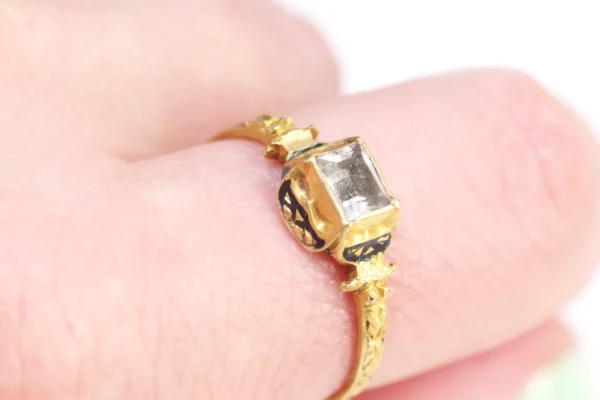 Out of Stock
1,00€
Out of Stock
1,00€Scarce rock crystal Renaissance ring in 22 Karat gold. This 16th-century ring is setted with a table-cut rock crystal in a closed setting. The bezel is decorated with black enamel with gold highlights and double crescent motifs, ending in four prongs. The shoulders feature fine chiseling. Renaissance ring from the 16th century, Western Europe. During the Renaissance, rings evolved from the simple forms of the medieval period to miniature works of art, combining the skills of the chiseler, engraver, enameler, and stone cutter. Cabochon settings persisted, but the evolution of stone cutting allowed for the increased use of table cuts.
Ring size: 57 EU or 8 US
Bezel dimensions: 7 x 8 mm
Estimated weight of the rock crystal: 0.49 ct
Note: For examples of similar 16th-century rings, see items 334 and 430 in Scarisbrick’s “Rings; Jewellery of Power, Love and Loyalty” (2007); item AF.1743 in the British Museum collection and items 279 and 281 in the “Victoria and Albert Museum Catalogue of Rings” by Oman (1930).
Condition: normal wear consistent with age, a missing part in the setting.
Weight: 2.91 gr
